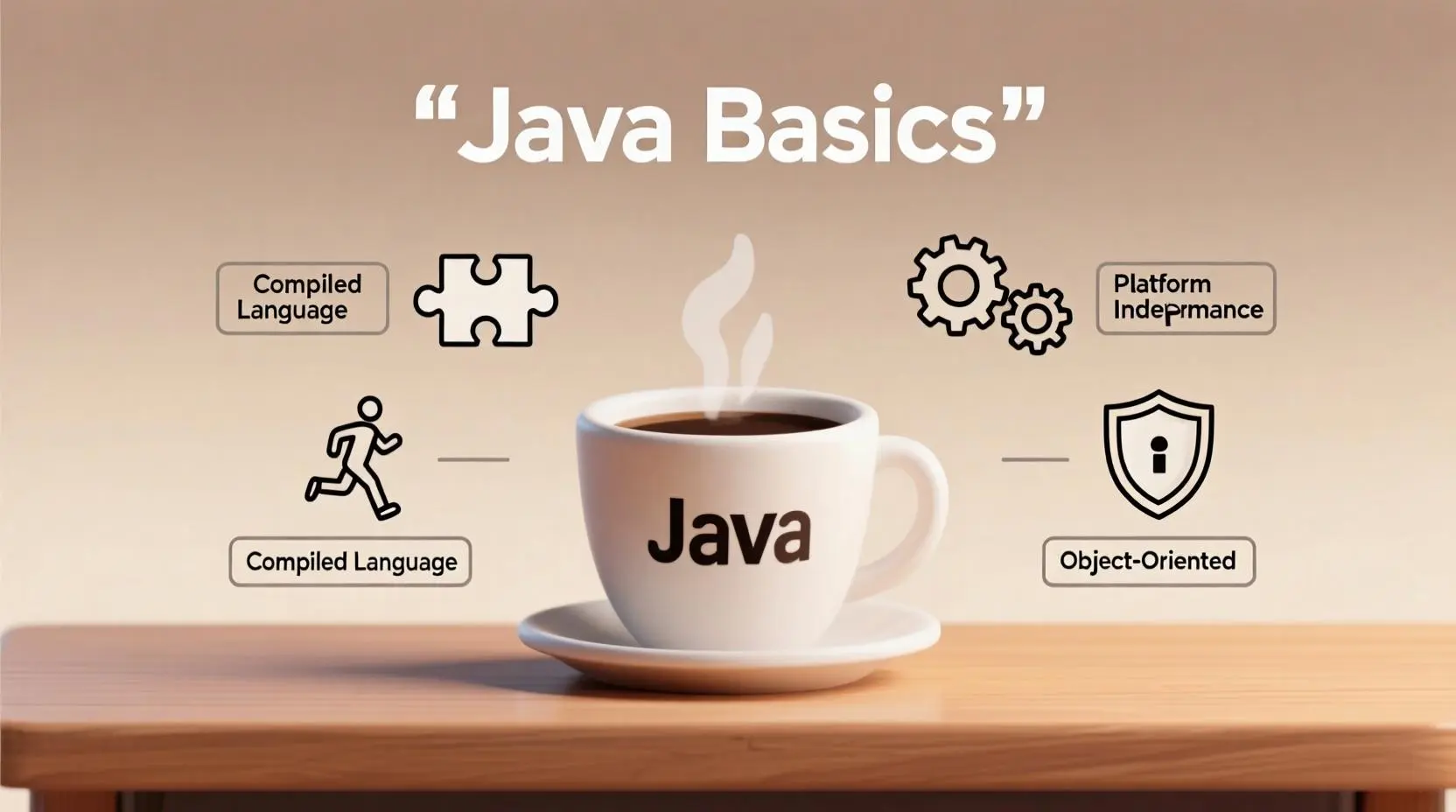Meta Description: Learn Java basics in this comprehensive guide for beginners. Understand Java syntax, variables, loops, methods, and object-oriented programming to kickstart your coding journey.
Introduction to Java
Java is one of the most popular programming languages in the world, known for its versatility, portability, and ease of use. Developed by Sun Microsystems in 1995, Java has become the backbone of many modern applications, from mobile apps to large-scale enterprise systems.
Unlike some programming languages, Java follows the “write once, run anywhere” principle, which means code written in Java can run on any device that has the Java Virtual Machine (JVM). This feature makes Java an essential language for beginners who want a robust foundation in programming.
Why Learn Java?
Learning Java has many advantages:
- Wide Application: Java is used in web development, mobile apps (especially Android), games, and enterprise software.
- Strong Community: Java has a large community of developers, making it easier to find support, tutorials, and libraries.
- Object Oriented: Java’s object-oriented nature teaches you important programming concepts that are transferable to other languages.
- Career Opportunities: Java skills are highly sought after in the job market, offering roles like Java developer, software engineer, and Android developer.
Java Syntax Basics
Java has a clear and structured syntax that makes it beginner-friendly. Here are some fundamental elements:
1. Hello World Example
Every programming journey begins with the classic “Hello World” program. In Java, it looks like this:
public class Main {
public static void main(String[] args) {
System.out.println("Hello World");
}
}
- public class Main: Defines a class named
Main. - public static void main(String[] args): The main method where Java starts execution.
- System.out.println: Prints text to the console.
2. Variables in Java
Variables store data in a program. Java has different types of variables:
- int: Stores integers
- double: Stores floating point numbers
- char: Stores a single character
- boolean: Stores true/false values
- String: Stores text
Example:
int age = 25;
double price = 19.99;
char grade = 'A';
boolean isJavaFun = true;
String name = "Laayal";
3. Operators
Operators perform operations on variables. Common types include:
- Arithmetic:
+,-,*,/,% - Comparison:
==,!=,>,<,>=,<= - Logical:
&&,||,!
Control Flow in Java
Control flow allows a program to make decisions and repeat actions.
1. Conditional Statements
Conditional statements let you execute code based on certain conditions:
int age = 18;
if (age >= 18) {
System.out.println("You are an adult.");
} else {
System.out.println("You are a minor.");
}
2. Loops in Java
Loops are used to repeat actions multiple times.
- For Loop:
for (int i = 0; i < 5; i++) {
System.out.println(i);
}
- While Loop:
int i = 0;
while (i < 5) {
System.out.println(i);
i++;
}
- Do While Loop:
int i = 0;
do {
System.out.println(i);
i++;
} while (i < 5);
Methods in Java
Methods are blocks of code designed to perform specific tasks. They make programs organized and reusable.
Example:
public class Main {
public static void greet() {
System.out.println("Hello, welcome to Java!");
}
public static void main(String[] args) {
greet();
}
}
public static void greet(): Declares a method calledgreet.greet(): Calls the method from the main method.
Object Oriented Programming (OOP) in Java
Java is an object-oriented language, which means it uses objects and classes to organize code.
1. Classes and Objects
A class is a blueprint for objects. Objects are instances of classes.
Example:
public class Car {
String color;
int year;
public void displayInfo() {
System.out.println("Car color: " + color + ", Year: " + year);
}
public static void main(String[] args) {
Car myCar = new Car();
myCar.color = "Red";
myCar.year = 2023;
myCar.displayInfo();
}
}
2. Encapsulation
Encapsulation restricts access to certain components of an object. It’s achieved using private variables and getter/setter methods.
public class Student {
private String name;
public void setName(String name) {
this.name = name;
}
public String getName() {
return name;
}
}
Java Arrays and Collections
Arrays and collections allow you to store multiple values in a single variable.
- Array Example:
int[] numbers = {1, 2, 3, 4, 5};
System.out.println(numbers[0]); // Output: 1
- ArrayList Example (Collection):
import java.util.ArrayList;
ArrayList<String> fruits = new ArrayList<>();
fruits.add("Apple");
fruits.add("Banana");
System.out.println(fruits);
Java Exception Handling
Exception handling ensures your program can handle errors gracefully.
try {
int result = 10 / 0;
} catch (ArithmeticException e) {
System.out.println("Cannot divide by zero!");
} finally {
System.out.println("This block executes always.");
}
try: Code that might throw an exception.catch: Handles the exception.finally: Executes regardless of exception occurrence.
Java Development Tools
To code in Java, you need:
- JDK (Java Development Kit): Provides tools to develop Java programs.
- IDE (Integrated Development Environment): Tools like Eclipse, IntelliJ IDEA, or NetBeans make coding easier.
Best Practices for Java Beginners
- Follow naming conventions for classes, methods, and variables.
- Write commented code for better readability.
- Avoid using magic numbers; use constants instead.
- Practice regularly to strengthen programming logic.
- Learn Java API libraries to make coding faster and easier.
Conclusion
Java is a versatile, beginner friendly programming language that opens doors to multiple career paths in software development. By understanding Java basics, including syntax, control flow, methods, OOP, arrays, and exception handling, you can build a solid foundation for advanced programming. Whether your goal is mobile app development, web applications, or game development, mastering Java will provide a powerful starting point.

Panvola
Panvola Debugging Definition Computer Programmer Gifts Student Teacher Coder Boyfriend Girlfriend IT Vacuum Insulated Tumbler Tech Support Travel Mug Stainless Steel With Straw Removable Lid (30 oz)
Make Your First 2D Game in Unity
Want to build your first game but don’t know where to start? This beginner-friendly guide shows you how to create SampleGame2D — a fun Flappy Bird–style project — step by step in Unity. Inside you’ll learn:

Scotch Thermal Laminating Pouches
Scotch Thermal Laminating Pouches, for Use with Thermal Laminators, 8.9 x 11.4 Inches, Letter Size Sheets, 100-Pack

Vooii for iPhone SE
Vooii for iPhone SE Case 2022/3rd/2020,iPhone 8/7 Case, Upgraded Liquid Silicone with [Flat Edges] [Camera Protection] [Soft Anti-Scratch Microfiber Lining] Phone Case for iPhone SE - Black


This really answered my problem, thank you!
Hiya, I’m really glad I’ve found this info. Nowadays bloggers publish only about gossips and net and this is really annoying. A good web site with exciting content, this is what I need. Thanks for keeping this web site, I’ll be visiting it. Do you do newsletters? Can’t find it.
Great write-up, I’m normal visitor of one’s blog, maintain up the nice operate, and It’s going to be a regular visitor for a lengthy time.
Definitely believe that which you said. Your favorite justification seemed to be on the internet the simplest thing to be aware of. I say to you, I certainly get annoyed while people think about worries that they plainly do not know about. You managed to hit the nail upon the top as well as defined out the whole thing without having side effect , people can take a signal. Will likely be back to get more. Thanks
Nice post. I was checking constantly this blog and I’m impressed! Very useful info specially the last part 🙂 I care for such info a lot. I was seeking this particular info for a long time. Thank you and best of luck.
There is clearly a bundle to identify about this. I feel you made some good points in features also.
certainly like your web site but you have to check the spelling on quite a few of your posts. Several of them are rife with spelling problems and I find it very bothersome to tell the truth nevertheless I will certainly come back again.
Hi would you mind sharing which blog platform you’re using? I’m going to start my own blog in the near future but I’m having a difficult time selecting between BlogEngine/Wordpress/B2evolution and Drupal. The reason I ask is because your design and style seems different then most blogs and I’m looking for something unique. P.S Sorry for getting off-topic but I had to ask!
I am very happy to read this. This is the kind of manual that needs to be given and not the random misinformation that’s at the other blogs. Appreciate your sharing this best doc.
Some truly fantastic info , Glad I discovered this.
You are my breathing in, I have few web logs and sometimes run out from to brand.